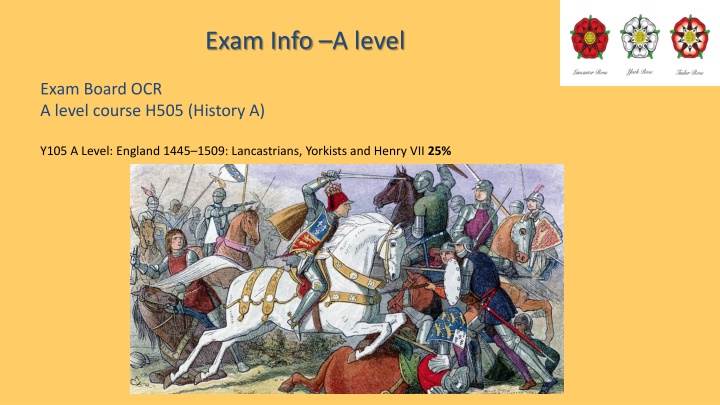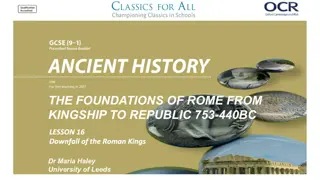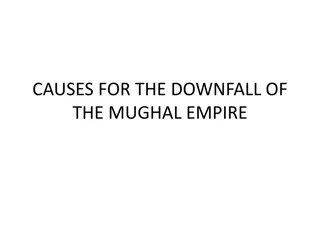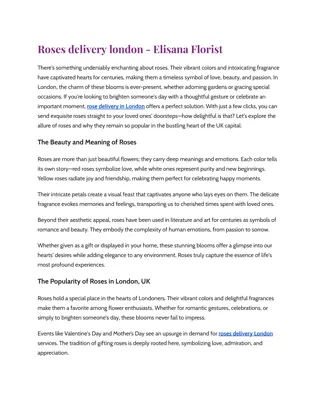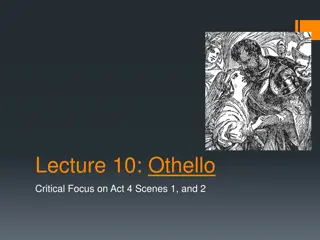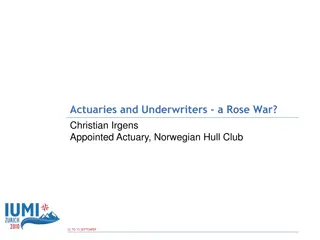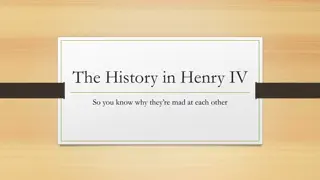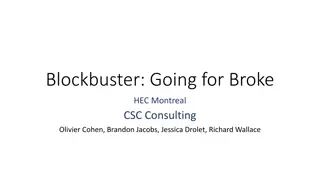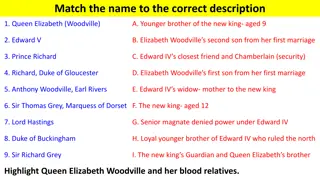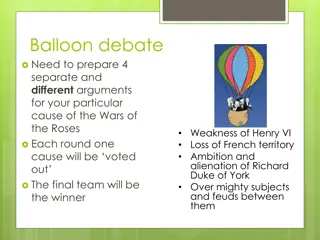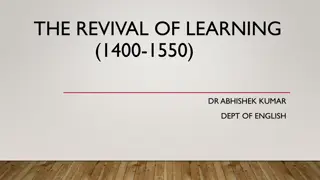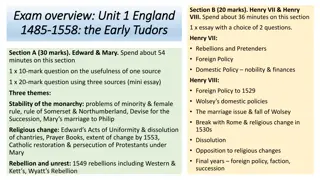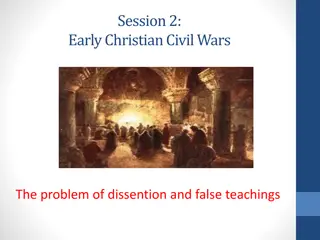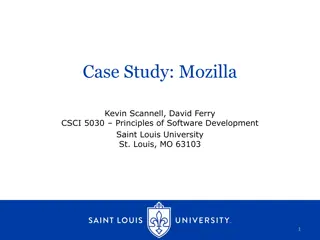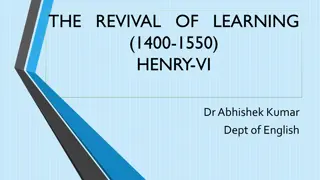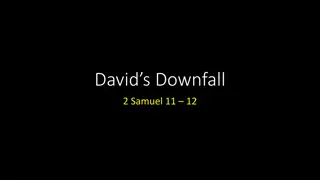Wars of the Roses (1445-1461): Source Analysis on the Downfall of Henry VI
This content delves into the Wars of the Roses period (1445-1461) in England, focusing on the outbreak of conflicts, political turmoil, and the downfall of Henry VI. It includes an inquiry topic, sample paper question, and a detailed analysis of a historical source (Source A) by Jack Cade regarding the governance of England and the role of prominent figures like the Duke of York. The examination of sources to support historical assertions and the evaluation of historical contexts are also highlighted.
Download Presentation

Please find below an Image/Link to download the presentation.
The content on the website is provided AS IS for your information and personal use only. It may not be sold, licensed, or shared on other websites without obtaining consent from the author.If you encounter any issues during the download, it is possible that the publisher has removed the file from their server.
You are allowed to download the files provided on this website for personal or commercial use, subject to the condition that they are used lawfully. All files are the property of their respective owners.
The content on the website is provided AS IS for your information and personal use only. It may not be sold, licensed, or shared on other websites without obtaining consent from the author.
E N D
Presentation Transcript
Exam Info A level Exam Board OCR A level course H505 (History A) Y105 A Level: England 1445 1509: Lancastrians, Yorkists and Henry VII 25%
Enquiry Topic: Wars of the Roses 14451461 The Outbreak of the Wars 1445 1450 The government of England c.1445; the growth of opposition, the issue of taxation, Henry VI s advisors, patronage, Cade s rebellion (1450); Henry s illness (1453 1455); the problem of the nobility; Somerset and York; failure in France to 1450 and its impact on government. The early actions of Richard, Duke of York heir (1453); York s first Protectorate (1454); York s removal from the Protectorate; York s response to the actions of Margaret of Anjou and the second Protectorate (1455). York s return from Ireland (1450); York s attempted coup (1452); reaction to the birth of Henry s War and the defeat of Richard, Duke of York of Margaret of Anjou; the role of Neville; the love-day (1458); flight of the Yorkists; Parliament of the Devils ; Battle of Northampton (1460); York as heir; death of York (1460) and Edward s claim to the throne. Battle of St Albans (1455); capture of Henry VI; restoration of York to the Protectorate; government
Enquiry Topic: Wars of the Roses 14451461 One source based question worth 30 marks No choice Sample paper: 1 Using these four sources in their historical context, assess how far they support the view that Henry VI was responsible for his own downfall. [30]
Using sources to support an assertion For example Using these FOUR sources in their historical context, assess how far they support the view that How does source A/B/C/D support/not support the view? What is the provenance of source A/B/C/D? What is the historical context of source A/B/C/D?
Source A: Jack Cade gives his views about the government of England in an appeal to the people. The king should have as his advisers men of high rank from his royal realm, that is to say, the high and mighty prince, the Duke of York, exiled from the service of the king by the suggestions of those false traitors the Duke of Suffolk and his followers. Jack Cade, The Complaint of the Poor Commons of Kent, 1450
In discussing how Source A does support the view, answers might refer to the weakness of the King in not having advisers of appropriate rank and in allowing this rebellion to occur. But again it could show the influence of ambitious nobles. In discussing the provenance of Source A, answers might suggest that the appeal was not really quite the rebellious manifesto it appeared, but part of noble strife. In discussing the historical context of Source A, answers might argue that A might show it was the King s fault because of the weaknesses in 1450 that allowed this revolt and because of the unpopularity of Suffolk; it could also be put in the context of York s ambitions.
Source B: A chronicler records on a concern about the succession expressed in Parliament. In Parliament Thomas Yonge of Bristol, apprentice in law, moved that because the king had no offspring, it would be necessary for the security of the kingdom that it should be openly known who should be his heir. And he named the Duke of York. For daring to do this, Thomas was afterwards imprisoned in to the Tower of London. The Annals of the Kings of England (Annales rerum anglicarum), May 1451
In discussing how Source B does not support the view, answers might refer to the fate of this MP for daring to suggest what the King should do as being a sign that the King s position was still respected. However, there is also the point that this impertinence was uttered, showing a weak king. In discussing the provenance of Source B, answers might comment on the relative impartiality of this report compared with Source C and Source D. In discussing the historical context of Source B, answers might argue that this shows the attempts by the ambitious lords to use Parliament, as Yonge was associated with York. It also reflects contemporary respect for the monarchy.
Source C: A chronicler comments on the dispute between York and Somerset. Soon after Easter 1455, another dispute arose between the noble Duke of York and the evil Duke of Somerset. For Somerset was plotting the destruction of the noble Duke of York. He offered advice to the king, saying that the Duke of York wished to depose the king and rule England himself which was manifestly false. Because of this, around the middle of May, the Duke of York and the Earls of Shrewsbury and Warwick approached London with seven thousand armed men. When the Duke of Somerset heard this news, he suggested to the king that York had come to usurp the throne. For this reason Henry sided with the Duke of Somerset. The Anonymous London Chronicle, for the year 1455
In discussing how far Source C supports the view, answers might refer to the factional strife, the armed forces deployed and the attempts to influence the King to show that it was not Henry s fault; but the source does show the King to be open to influence and thus weak. In discussing the provenance of Source C, answers might point to the partisan nature of the account the noble York and the evil Somerset. In discussing the historical context of Source C, answers might argue that although Source C argues that the powerful families were more to blame and York s ambition could be shown, the previous weaknesses of the King in allowing this situation to develop might be important.
Source D: A chronicler comments on the government of England in 1459. The realm of England was not well governed for King Henry VI was child like and influenced by greedy advisors. He was owed more than he was worth. His debts increased daily, but payment was there none; all the possessions and lordships that belonged to the crown the king had given away, some to lords and some to other lesser persons, so that he had almost nothing left of his own. And the money taken from the people was wasted, as all the taxes that came from them were spent in vain. The king did not have a proper household as a king should nor was he able to maintain any wars. The queen with her supporters ruled the realm as she liked, gathering innumerable riches. The queen was defamed and slandered. It was said her son, who was called the heir to the throne, was not her son but was an illegitimate child born as a result of her adultery; wherefore she, dreading that he should not succeed to his father s throne, allied unto her all the knights and squires of Cheshire. A Chronicle of the reigns of Richard II, Henry IV, Henry V and Henry VI, c.1465
In discussing how Source D does support the view, answers might refer to the child-like King, who had allowed the queen to get out of control and even to have a child that was not his. There is reference to his mismanaging the finances and foolishly giving away resources. In discussing the provenance of Source D, answers might comment on the hearsay evidence about the queen and the imbalanced hostility to the King, even if this is reasonably contemporary evidence. In discussing the historical context of Source D, answers might argue that although Source D argues that the King is to blame and there is evidence of debt and obvious failure in the war in France, there is little to justify the rumours and the role of the over-mighty subjects is not to be found here.
British Period Study: England 14611509 Edward IV s first rule and the crisis of 1470 1471 Edward IV s management of the government; Edward s relations with the nobility; unrest; marriage to Elizabeth Woodville including the Earl of Warwick; relations with France; Edward s fall from power and the restoration of Henry 1470 1471 including the role of Margaret of Anjou. Edward IV and Richard III 1471 1485 Edward IV s management of government; relations with the nobility; finances; Richard III s accession; claim to the throne, the Princes in the Tower, the removal of the Woodvilles and Hastings; the Buckingham rebellion; government under Richard III, policy towards the nobility; defeat by Henry Tudor and reasons for his overthrow. Henry VII s rule in England 1485 1509 Henry s claim to the throne; Yorkist opposition, Lovel, Stafford and Suffolk, the Pretenders, Simnel and Warbeck; relations with the nobility, rewards and punishments; royal finances and their administration, opposition to taxation in Yorkshire and Cornwall; administration, the personnel, Councils, local government and parliament. Henry VII s foreign policy 1485 1509 England s position in Europe in 1485, Henry VII s aims; relations with Burgundy, France, Scotland and Spain; treaties of Medina del campo, Redon, Etaples and Ayton; marriage negotiations; trade agreements, including Magnus Intercursus and Malus
British Period Study: England 14611509 Complete one essay out of a choice of two worth 20 marks Sample paper: The most important reason for Edward IV s failure to establish royal authority in the period 1461 1470 was the power of the Earl of Warwick How far do you agree? [20] OR 3* How successful was the foreign policy of Henry VII? [20]
https://formulabotanica.com/wp-content/uploads/2015/02/Scales.jpghttps://formulabotanica.com/wp-content/uploads/2015/02/Scales.jpg The most important reason for Edward IV s failure to establish royal authority in the period 1461 1470 was the power of the Earl of Warwick . How far do you agree? In arguing that the power of Warwick was the most important reason, answers might consider the role of Warwick in restoring Henry VI to the throne. Answers might consider the offices held by Warwick and the power that it gave him. Answers might consider the role of Warwick in putting Edward on the throne and his subsequent expectations. Answers might consider Warwick s loss of pride with the abandonment of the French marriage, and his personality and ambition which drove him into further rebellion. In arguing that the power of Warwick was not the most important reason, answers might consider Edward s mistakes, such as his marriage to Elizabeth Woodville. Answers might consider the role of Margaret of Anjou. Answers might consider the role of over mighty subjects. Answers might consider the availability of an alternative monarch in Henry VI who could claim to be the legitimate ruler.
https://formulabotanica.com/wp-content/uploads/2015/02/Scales.jpghttps://formulabotanica.com/wp-content/uploads/2015/02/Scales.jpg How successful was the foreign policy of Henry VII? In arguing that Henry s foreign policy was successful, answers might consider his gaining of foreign recognition from powers such as Spain. Answers might consider his success in defending national security from the challenges of Pretenders. Answers might consider the success in achieving marriage alliances with Scotland and Spain. Answers might consider his success in avoiding costly overseas warfare. In arguing that Henry s foreign policy was not successful, answers might consider his exclusion from the League of Cambrai. Answers might consider his failure to preserve the independence of Brittany. Answers might consider his failure to find a wife after the death of Elizabeth and the problems created with Spain after the death of Arthur. Answers might consider the problem of Yorkist support in Burgundy.
